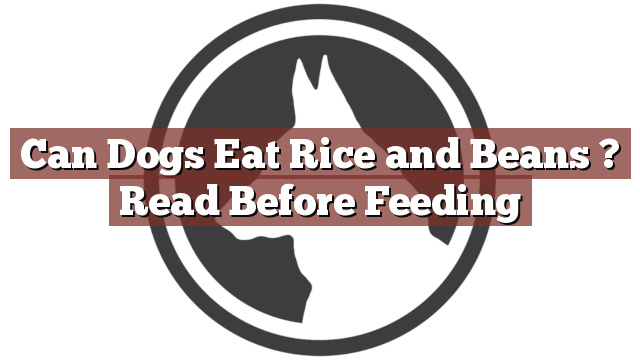Understanding Your Dog’s Dietary Needs
As responsible pet owners, it is crucial to understand our dog’s dietary needs to ensure their overall health and well-being. Dogs, being omnivores, require a balanced diet that consists of proteins, carbohydrates, fats, and essential vitamins and minerals. While their primary source of nutrition should come from commercial dog food, many pet owners may wonder if they can supplement their dog’s diet with other human foods, such as rice and beans.
Can Dogs Eat Rice and Beans? Read Before Feeding
Can dogs eat rice and beans? The answer is yes, but with some important considerations. Rice and beans can be a healthy addition to your dog’s diet when prepared and served in moderation. Both rice and beans are excellent sources of carbohydrates, which provide energy for your furry friend. However, it is crucial to note that plain white rice is generally more easily digestible for dogs compared to other types of rice, such as brown or wild rice. Furthermore, it is essential to properly cook the rice and beans before offering them to your dog, ensuring they are fully cooked and without any added seasonings or spices.
Pros and Cons of Feeding Rice and Beans to Your Dog
Feeding rice and beans to your dog can have its advantages and disadvantages. One advantage is that rice and beans are low in fat and can provide a good source of fiber for your canine companion. The fiber content can aid in regulating your dog’s digestion and promote a healthy bowel movement. Additionally, rice and beans are potentially less allergenic compared to other food items. However, it is important to remember that every dog is different, and some dogs may have specific dietary restrictions or sensitivities. Therefore, it is crucial to introduce rice and beans gradually and monitor your dog for any signs of gastrointestinal upset or allergic reactions.
In Conclusion: Moderation and Consultation are Key
While rice and beans can be a nutritious addition to your dog’s diet, it is crucial to remember that moderation is key. Yes, dogs can eat rice and beans, but it should not make up the majority of their daily meals. It is always best to consult with your veterinarian before making any significant changes to your dog’s diet. Your vet will be able to provide personalized advice based on your dog’s specific needs, taking into consideration their breed, age, size, and any existing health conditions. By working together with your vet and practicing moderation, you can ensure that your dog receives a well-balanced and wholesome diet that contributes to their overall health and happiness.
Thank you for taking the time to read through our exploration of [page_title]. As every dog lover knows, our furry friends have unique dietary needs and responses, often varying from one canine to another. This is why it's paramount to approach any changes in their diet with caution and knowledge.
Before introducing any new treats or making alterations to your dog's diet based on our insights, it's crucial to consult with a veterinarian about [page_title]. Their expertise ensures that the choices you make are well-suited to your particular pet's health and well-being.
Even seemingly harmless foods can sometimes lead to allergic reactions or digestive issues, which is why monitoring your dog after introducing any new food item is essential.
The content provided here on [page_title] is crafted with care, thorough research, and a genuine love for dogs. Nevertheless, it serves as a general guideline and should not be considered a substitute for professional veterinary advice.
Always prioritize the expert insights of your veterinarian, and remember that the health and happiness of your furry companion come first.
May your journey with your pet continue to be filled with joy, love, and safe culinary adventures. Happy reading, and even happier snacking for your canine friend!

